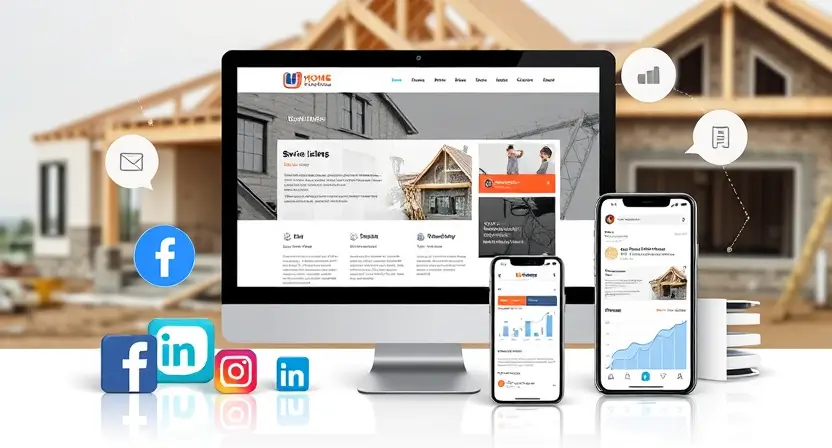Becoming a vendor for home builders can open up new business opportunities. It involves understanding the industry, building relationships, and meeting specific requirements. To become a vendor for home builders, start by researching the industry. Know who the major players are and what they need. This helps you tailor your offerings to meet their demands. Next, build strong relationships. Attend industry events and networking opportunities.

This can help you get your foot in the door. Finally, meet their requirements. This might include having the right licenses, insurance, and quality standards. By focusing on these steps, you can position yourself as a reliable vendor. This guide will help you navigate the process and increase your chances of success.
Introduction To Vendor Opportunities
Becoming a vendor for home builders can be a profitable business. Builders need various services and supplies to complete their projects. This opens up many opportunities for vendors who can meet these needs. Understanding the roles and importance of different vendors can help you get started.
Importance Of Vendors
Vendors are crucial for the success of home building projects. They supply materials, offer services, and provide specialized expertise. Home builders rely on vendors to ensure timely and quality completion of their projects. Reliable vendors help builders meet deadlines and stay within budget. This creates a win-win situation for both parties.
Types Of Vendors For Home Builders
There are different types of vendors that home builders typically work with. Each type has a unique role in the building process.
| Vendor Type | Role |
|---|---|
| Material Suppliers | Provide essential building materials like wood, cement, and steel. |
| Subcontractors | Offer specialized services like plumbing, electrical work, and roofing. |
| Equipment Rental Companies | Supply heavy machinery and tools needed for construction. |
| Landscaping Services | Handle the design and maintenance of outdoor spaces. |
| Interior Designers | Assist with the decoration and furnishing of the completed homes. |
Understanding these vendor types can help you identify where you fit in. Assess your skills and services to determine how you can best serve home builders.
Research The Market
Researching the market is crucial for becoming a vendor for home builders. You need to understand the industry, your competitors, and potential clients. This knowledge helps you tailor your offerings and approach. Here’s how to get started:
Identify Potential Clients
Start by identifying home builders in your area. Look for both large companies and small firms. Each type of client has different needs. Check local business directories and online resources. Attend industry events and trade shows. Network with professionals in the field.

Understanding your potential clients helps you know their demands. It allows you to offer the right products and services. You can also learn about their buying habits. This information is key to crafting effective marketing strategies.
Analyze Competitors
Analyzing your competitors is another essential step. Identify other vendors working with home builders. Study their products and services. Look at their pricing, quality, and customer service. Visit their websites and read customer reviews.
Understanding your competitors gives you an edge. You can identify gaps in the market. You can also find ways to differentiate your offerings. This helps you stand out and attract more clients.
By researching the market thoroughly, you position yourself for success. You become a vendor that home builders trust and rely on.
Develop A Business Plan
Crafting a solid business plan is essential for becoming a vendor for home builders. Identify your target market, outline your services, and establish clear goals.

Creating a business plan is a crucial step for anyone aiming to become a vendor for home builders. This plan serves as a blueprint for your business. It helps you outline your goals, budget, and strategies.
Set Clear Goals
Define what you want to achieve as a vendor. Identify the specific services or products you will offer. Determine the target market. Create both short-term and long-term goals. This helps to stay focused and motivated.
Budget And Financial Planning
Create a detailed budget. Outline all possible expenses and income sources. Plan for unexpected costs. Ensure you have enough capital to start and sustain your business. Understand your financial needs and limitations. This helps you avoid financial pitfalls.
Developing a business plan involves careful planning and foresight. It’s the foundation for your success as a vendor for home builders.
Legal Requirements
Understanding the legal requirements to become a vendor for home builders is crucial. Ensuring compliance with these regulations builds trust and credibility. This section delves into the key legal aspects you need to know.
Business Licenses
A business license is essential. It allows you to operate legally. Check with your local government for specific requirements. Each region may have different rules. Make sure you meet all criteria to avoid penalties.
Insurance Needs
Insurance is vital for vendors working with home builders. General liability insurance protects you from potential lawsuits. It covers damages or injuries that may occur. Workers’ compensation insurance is also important. It ensures your employees are covered in case of accidents. Verify the specific insurance requirements with your local authorities.
Create A Strong Portfolio
Creating a strong portfolio is essential to become a vendor for home builders. A well-crafted portfolio can showcase your expertise, unique skills, and past projects. It’s your chance to make a great first impression. Let’s dive into some key elements to include in your portfolio.

Showcase Past Work
Potential clients want to see what you have done before. Include high-quality photos of your completed projects. Use clear, bright images that highlight your work’s quality. Add brief descriptions for each photo.
- Describe the project’s scope and your role.
- Mention any challenges you overcame.
- Include client testimonials if possible.
This not only shows your skills but also builds trust.
Highlight Unique Skills
What sets you apart from other vendors? Highlight your unique skills. Whether it’s custom cabinetry, sustainable materials, or innovative designs, make it known.
Use bullet points to list:
- Special certifications
- Advanced techniques
- Unique materials
These elements can make you stand out. They provide more value to potential clients.
Networking And Building Relationships
Building a strong network is crucial for becoming a vendor for home builders. Networking helps you connect with key players in the industry. Through these connections, you can create opportunities for collaboration and growth. Building relationships takes time and effort, but the rewards are worth it. Here are some effective ways to network and build relationships.
Attend Industry Events
Industry events provide a great platform for networking. You can meet potential clients and partners. These events often feature workshops and seminars. These sessions offer insights into industry trends and best practices. They are also a chance to showcase your products or services.
- Trade shows
- Conferences
- Networking dinners
Prepare a quick pitch about your business. Have business cards ready to hand out. Follow up with new contacts after the event.
Join Professional Associations
Joining professional associations can expand your network. These associations offer regular meetings and events. They are a great way to meet industry professionals. Membership can also give you access to exclusive resources and industry reports.
| Association | Benefits |
|---|---|
| National Association of Home Builders | Networking, resources, industry reports |
| Local Builders Associations | Community events, local insights |
Get involved in association activities. Volunteer for committees or projects. This shows your commitment and helps build trust.
Marketing Your Services
Becoming a vendor for home builders requires you to market your services effectively. Strong marketing can set you apart. It helps you gain trust and attract new clients.
Online Presence
Your online presence is crucial. A website is the first step. It should be easy to navigate. Include all your services. Show testimonials from past clients. This builds credibility.

Use social media platforms. Post regularly. Share updates about your services. Engage with your followers. Answer their questions. This builds a community around your brand. Consider online advertising. Google Ads and social media ads can reach a wider audience. They can direct more traffic to your website. This increases your chances of getting new clients.
Traditional Marketing Methods
Traditional marketing methods still work. Print flyers and brochures. Distribute them in areas where home builders frequent. These can include trade shows and construction sites. Attend trade shows. Networking events can be beneficial. They allow you to meet potential clients. You can showcase your services directly to home builders.
Consider direct mail campaigns. Send personalized letters to home builders. Include your service details and contact information. Personal touches can make a big difference. Use local newspapers and magazines. They can help you reach a local audience. Many home builders still rely on these sources for finding vendors.
Submitting Proposals And Bids
Submitting proposals and bids is a critical step in becoming a vendor for home builders. Creating a well-crafted proposal and employing effective pricing strategies can set you apart from the competition. Here are some key aspects to consider.
Writing A Proposal
A strong proposal can make a significant impact. Here’s what to include:
- Introduction: Begin with a brief introduction about your company.
- Experience: Highlight your experience and past projects.
- Services Offered: Clearly outline the services you provide.
- Timeline: Provide an estimated timeline for project completion.
- References: Include references from previous clients.
Use clear and concise language. Avoid jargon. Make your proposal easy to read.
Pricing Strategies
Pricing your services competitively is crucial. Consider these strategies:
- Research: Research your competitors’ pricing. Understand the market rates.
- Cost Analysis: Calculate your costs. Ensure you cover your expenses.
- Value Proposition: Highlight the value you bring. Justify your pricing.
- Flexibility: Offer flexible pricing options. Cater to different budgets.
Transparency in pricing builds trust. Clearly outline what is included in your pricing.
Maintaining Vendor Relationships
Building strong vendor relationships is crucial for home builders. Good vendor relationships ensure smooth operations and high-quality results. Vendors provide essential materials and services that directly impact the final product. Maintaining these relationships requires effort and commitment.
Providing Excellent Service
Vendors must provide excellent service to maintain strong relationships. Timely deliveries and high-quality materials are critical. Clear communication helps avoid misunderstandings. Consistency in service builds trust and reliability.
Handling Feedback And Complaints
Responding to feedback and complaints promptly is essential. Address issues professionally and find solutions quickly. Understand the concerns of home builders and take corrective actions. Apologize for any mistakes and show a willingness to improve.
Continuous Improvement
Continuous improvement is essential in becoming a successful vendor for home builders. By constantly enhancing your skills and staying updated, you can meet the needs of home builders and grow your business.

Staying Updated With Industry Trends
Home building trends change rapidly. Keeping up with these changes helps you stay relevant. Read industry magazines and websites regularly. Attend trade shows and seminars to learn new techniques. Network with other professionals to share insights. This knowledge keeps you ahead of the competition.
Enhancing Skills And Services
Improving your skills is crucial. Take online courses or attend workshops. Learn about new materials and technologies. Offer new and improved services to attract home builders. Always seek feedback from clients. Use it to refine your services. This shows you are committed to quality and improvement.
Frequently Asked Questions
How Do I Start As A Vendor?
To start as a vendor, research the market, prepare your products, and contact home builders. Ensure you have competitive pricing and quality products. Networking at industry events can also help.
What Qualifications Do I Need?
Qualifications vary, but having relevant experience and certifications can help. Understanding the construction industry and having a strong portfolio are beneficial.
How To Approach Home Builders?
Approach home builders by presenting a professional portfolio and highlighting your unique selling points. Attend industry events and use online platforms to connect.
What Products Are In Demand?
Products like quality building materials, fixtures, and appliances are in demand. Eco-friendly and innovative solutions are increasingly popular.
Conclusion
Becoming a vendor for home builders takes effort and patience. Build strong relationships. Focus on delivering quality products consistently. Research and understand builder needs. Offer competitive pricing and reliable service. Stay updated on industry trends. Good communication is key. Attend trade shows and network with professionals. Follow up on leads promptly. With dedication, you can establish a successful partnership. Remember, persistence pays off. Good luck on your journey to becoming a trusted vendor!


